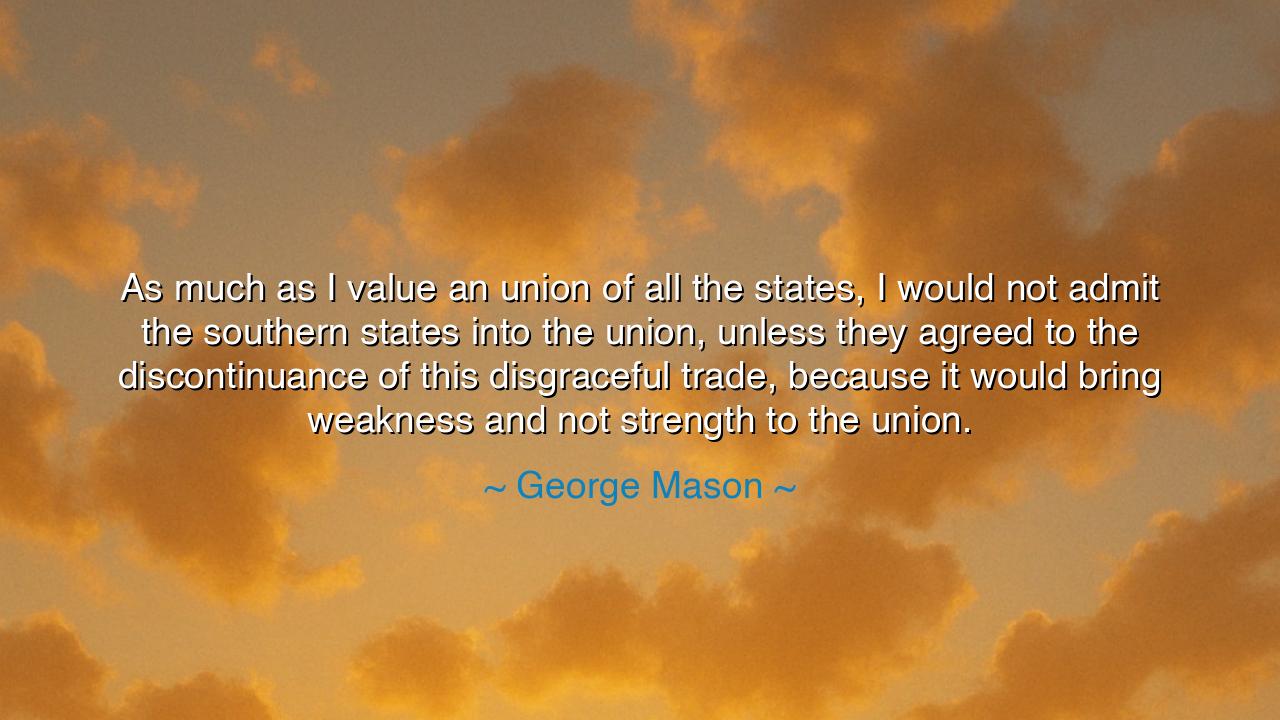
As much as I value an union of all the states, I would not admit
As much as I value an union of all the states, I would not admit the southern states into the union, unless they agreed to the discontinuance of this disgraceful trade, because it would bring weakness and not strength to the union.






Hear now the words of George Mason, a voice rising from the birth-pangs of a nation: “As much as I value an union of all the states, I would not admit the southern states into the union, unless they agreed to the discontinuance of this disgraceful trade, because it would bring weakness and not strength to the union.” In these words lies the cry of conscience amid ambition, a declaration that the greatness of a union rests not merely in numbers or wealth, but in the purity of its foundation. For what is a house built upon corruption but a ruin waiting to fall? Mason spoke not only of politics, but of eternal truths, truths that outlive nations and echo across centuries.
The origin of these words lies in the Constitutional Convention of 1787, when men debated the shape of a fledgling republic. Many sought unity at any cost, willing to compromise with the slave trade, that grievous scourge upon humanity. But Mason, though himself a Virginian slaveholder, saw with prophetic eyes the poison that such a practice would bring. He declared it not a source of strength, but of weakness, knowing that no bond of states could endure long if it was bound by chains of injustice. Thus, his words were not merely a rebuke to his fellow delegates, but a warning for generations—that moral corruption within a nation becomes its deepest wound.
Consider, by way of history, the fate of the mighty Roman Republic. When Rome was young, it stood for discipline, honor, and the virtue of its citizen-soldiers. But as wealth poured in from conquered lands, Rome turned to slavery, corruption, and the cheap labor of the oppressed. The strength of its people decayed, the spirit of the republic withered, and in time, Rome was devoured from within. So too did Mason foresee: if the United States permitted the “disgraceful trade”, its foundation would be cracked, and the ruin, though delayed, would surely come. And indeed, nearly a century later, the Union was torn apart in civil war, fulfilling the prophecy of weakness born of injustice.
These words remind us that unity without justice is false unity. A chain of states bound together by profit at the expense of human dignity could never endure. Mason’s wisdom speaks to every generation: do not mistake the appearance of strength for its reality. A nation, a family, or even a soul may seem whole while harboring corruption, but time will strip away the mask. Only when a bond is rooted in truth and righteousness can it weather storms and stand unbroken.
The emotional power of Mason’s stand lies in his willingness to value principle above expedience. Many men of his day chose silence for the sake of convenience. But Mason raised his voice, knowing well that it might be ignored, and that he himself was not free of the very contradictions he condemned. Yet still he spoke, for he understood that history judges not merely deeds, but the courage to declare the truth when it is hardest. Here we see the eternal law: that even imperfect men, when guided by conscience, can plant seeds of wisdom for ages unborn.
From his words we learn a timeless lesson: the greatness of any union—whether of states, of communities, or of hearts—depends on the virtue that holds it together. Compromise with evil may win temporary peace, but it will not yield lasting strength. If one builds a house with rotting timbers, it will collapse in the storm. So too with nations, so too with lives. Better a smaller union rooted in justice than a vast empire founded upon cruelty.
Let this teaching guide our actions. In your life, do not join yourself to practices, partnerships, or ambitions that compromise your integrity. Do not build alliances at the cost of your conscience. Seek unity, but not unity with corruption. Seek strength, but not strength born of injustice. Be willing, like Mason, to say: “I value harmony, but not at the price of righteousness.” In this way, your bonds will endure, your house will stand, and your legacy will be one of true strength.
Thus, O seeker, hear the ancient wisdom: justice is the cornerstone, conscience the architect, and integrity the mortar of all lasting unions. When Mason raised his voice, he sowed words that still guide us. Take them into your heart, and in your dealings—be they great or small—let no “disgraceful trade” find room. For what you build upon truth will stand unshaken; what you build upon falsehood will fall. This is the eternal law, passed down from the ancients, and proven again in every age.






AAdministratorAdministrator
Welcome, honored guests. Please leave a comment, we will respond soon